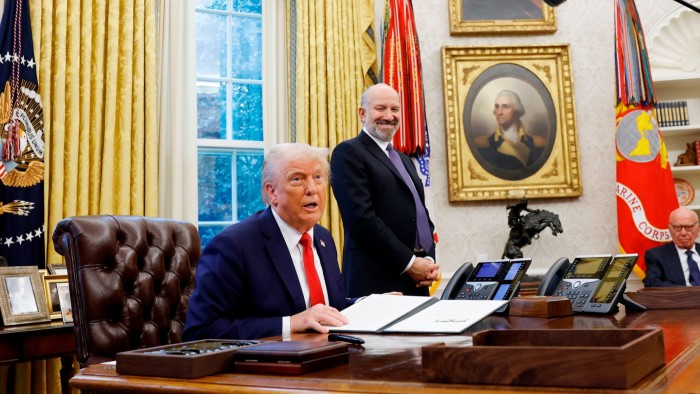Unlock the White House Watch newsletter for free
Your guide to what the 2024 US election means for Washington and the world
US President Donald Trump halted sweeping tariffs on Mexico and Canada just hours before they were due to come into force, pulling North America back from the brink of a damaging trade war.
Deals to delay tariffs on America’s two biggest trading partners by a month were announced on Monday following separate bilateral calls between Trump and Mexican President Claudia Sheinbaum and Canadian Prime Minister Justin Trudeau.
Trump had unnerved allies and investors with a weekend announcement of huge levies on Canada, Mexico and China.
The 10 per cent tariff on China — which comes on top of existing levies — is still due to take effect on Tuesday. Trump on Monday described those duties as an “opening salvo” in his renewed trade offensive against the world’s second-largest economy.
Beijing is considering its options for retaliation, including counter-tariffs, export controls and currency depreciation, and has already said it would file a lawsuit with the World Trade Organization in objection to the tariffs. Trump is expected to speak with China’s leader Xi Jinping in the coming days, the White House said on Monday.
Trump’s reversal with America’s neighbouring trade partners came after Sheinbaum and Trudeau both agreed to place 10,000 troops at their borders with the US and combat drug trafficking, winning them a 30-day reprieve from levies that would have disrupted hundreds of billions of dollars a year in trade and potentially ignited a tit-for-tat skirmish.
As part of the package of border measures, Trudeau vowed to provide C$200mn ($138mn) of funding tied to “organised crime and fentanyl” and appoint a “fentanyl tsar”. Ottawa will also list cartels as terrorist organisations and launch a “Canada-US Joint Strike Force to combat organised crime, fentanyl and money laundering”.
“The Tariffs announced on Saturday will be paused for a 30 day period to see whether or not a final economic deal with Canada can be structured,” Trump said late on Monday on his Truth Social platform, having hours earlier indicated that he would hold a month of “negotiations” with Mexico.
The Canadian dollar, Mexican peso and US stocks had taken a hit early on Monday after Trump at the weekend said he would follow through with threats to hit Canada and Mexico with 25 per cent tariffs, with a few carve-outs. The tariffs were broadly expected to have a profound impact on businesses and the broader economy in all three countries.
Asia-Pacific equities rose in early trading on Tuesday. Wall Street stocks sharply trimmed their losses, however, as Trump wound back his stance on imminent tariffs. The Canadian dollar and peso also recovered by Monday evening.
“This is a huge relief, getting a deal,” said Flavio Volpe, president of Canada’s Automotive Parts Manufacturers’ Association, an industry that was expected to sustain a heavy blow from the tariffs.
Despite the pause, the White House said in an executive order on Monday evening that “if the illegal migration and illicit drug crises worsen, and if the government of Mexico fails to take sufficient steps to alleviate these crises, the president shall take necessary steps to address the situation”.
Trump insists the tariffs on Mexico and Canada are needed to get the two countries to do more to stop migrants and drugs crossing into the US.
US companies have pushed back against the tariff plans, warning they would push up prices for Americans and upend supply chains.
Sheinbaum said her call with Trump, which she described as a “good conversation”, lasted about 45 minutes. She said she explained Mexico’s concerns over the smuggling of sophisticated weapons from the US that were being used by the country’s criminal groups. She added that the US president had agreed to help stop the arms trafficking.
The Mexican leader said Trump also brought up the trade deficit between the countries.
“I told him that, in reality it wasn’t a deficit, that we had a trade deal, that we were trade partners and that this was the result of being trade partners; and that either way it was the best way to keep competing against China and other regions of the world,” Sheinbaum said.
Trudeau similarly said he had a “good call” with Trump, adding that “Canada is implementing our C$1.3bn border plan — reinforcing the border with new choppers, technology and personnel, enhanced co-ordination with our American partners, and increased resources to stop the flow of fentanyl.”
Reporting by Christine Murray and Michael Stott in Mexico City, Aime Williams in Washington, Harriet Clarfelt in New York, Joshua Oliver in Ottawa, Ilya Gridneff in Toronto and Joe Leahy in Beijing
Read the full article here



